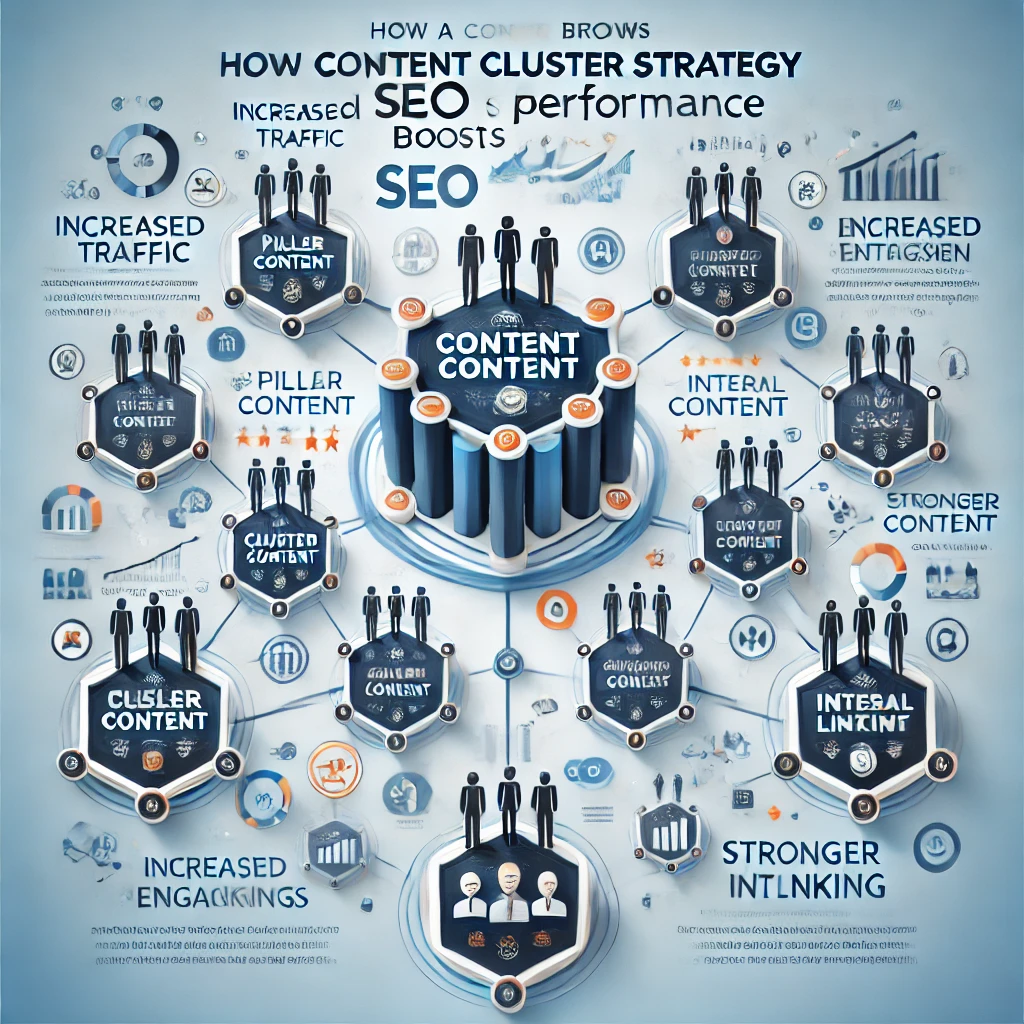How a content cluster strategy can boost your SEO performance
In today’s highly competitive digital landscape, SEO strategies are constantly evolving. One of the most effective approaches to improving website rankings and visibility is the content cluster strategy. This method not only organizes your content in a way that’s user-friendly but also helps search engines understand your site’s authority on specific topics. So, what exactly are content clusters, and how do they play a crucial role in modern SEO? Let’s dive into the details of content cluster strategy and its impact on SEO.
What Are Content Clusters?
A content cluster is a grouping of related content that centers around a pillar page, which is a comprehensive piece of content covering a broad topic. The pillar page acts as the main hub, linking to multiple, more specific content pieces—also known as cluster content—on subtopics within the broader subject. These clusters are interlinked, creating a network of content that signals to search engines that your website is a rich, authoritative resource on a particular subject.
For example, if you run a fitness blog, your pillar page could focus on “Nutrition for Fitness” while your cluster content could include posts on “Protein-Rich Foods for Athletes,” “Carbs vs. Fats for Muscle Gain,” and “How to Calculate Your Daily Calorie Needs.” These pages, when linked together, form a content cluster that boosts your site’s authority in the fitness and nutrition niche.
How Content Clusters Impact SEO
1. Improved Site Architecture and User Experience
The content cluster strategy isn’t just beneficial for SEO algorithms; it also improves the user experience. When visitors arrive at a pillar page, they can easily navigate to related content through internal links, providing a more intuitive browsing experience. This interconnectedness helps users explore topics in-depth and find answers to their questions without having to search for information on other websites.
For search engines, the clear structure of content clusters helps crawl and index your website more effectively. Google’s algorithms can better understand how your pages relate to each other, allowing them to serve your content to the right audience. As a result, your pages are more likely to rank for multiple related keywords.
2. Enhanced Keyword Targeting and SEO Cluster Optimization
A well-executed content cluster strategy allows for better keyword targeting. The pillar page focuses on a broad, high-volume keyword, while the cluster content targets long-tail, more specific keywords. This enables you to capture a wider range of search queries related to your core topic. For example, a website that creates content clusters around “digital marketing” could also rank for long-tail keywords like “SEO strategies for eCommerce” or “content marketing tips for small businesses.”
By optimizing for these related keywords, you’re not just targeting one keyword but creating a network of related terms that improve your visibility in search engine results pages (SERPs). This helps you dominate search rankings for a particular topic.
3. Boosting Authority and Relevance
The topic cluster impact is most evident in how it helps boost your site’s authority on a specific subject. When you create a series of related content, search engines view this as an indication that your website is an expert in the field. By consistently publishing well-researched, high-quality content on a specific topic and linking it all together, you’re signaling to search engines that your site is a valuable resource. This can lead to higher domain authority and better search engine rankings.
4. Increased Traffic and Conversion Potential
Since content clusters target multiple keywords within a single topic, they increase your chances of ranking for a broader range of search queries. As a result, you’re likely to see an increase in organic traffic. Moreover, by having a variety of related content, you can also guide users through the buyer’s journey, improving your conversion potential. If your content effectively answers your audience’s questions, visitors are more likely to convert into customers, clients, or subscribers.
A Powerful Strategy to Elevate SEO
The content cluster strategy is a powerful tool in modern SEO. By organizing your content into clear, cohesive groups centered around pillar pages, you create an optimized site structure that appeals to both users and search engines. This approach not only boosts your SEO performance through improved keyword targeting, better site architecture, and increased authority but also provides your audience with a more seamless and engaging experience. If you’re looking to enhance your website’s SEO and increase organic traffic, adopting a content cluster strategy should be a top priority.





